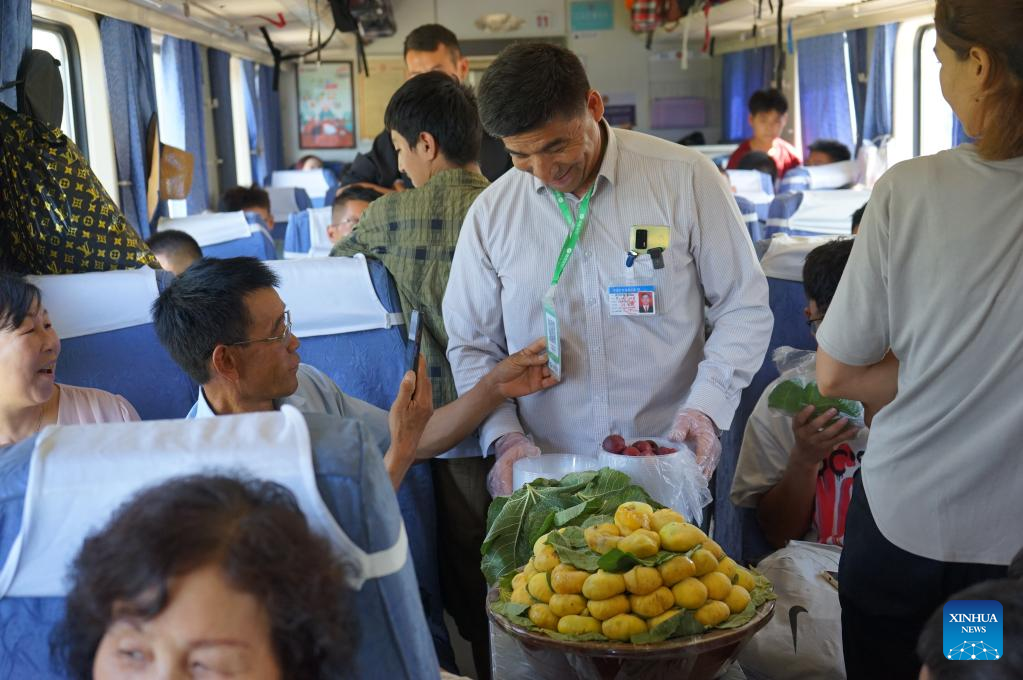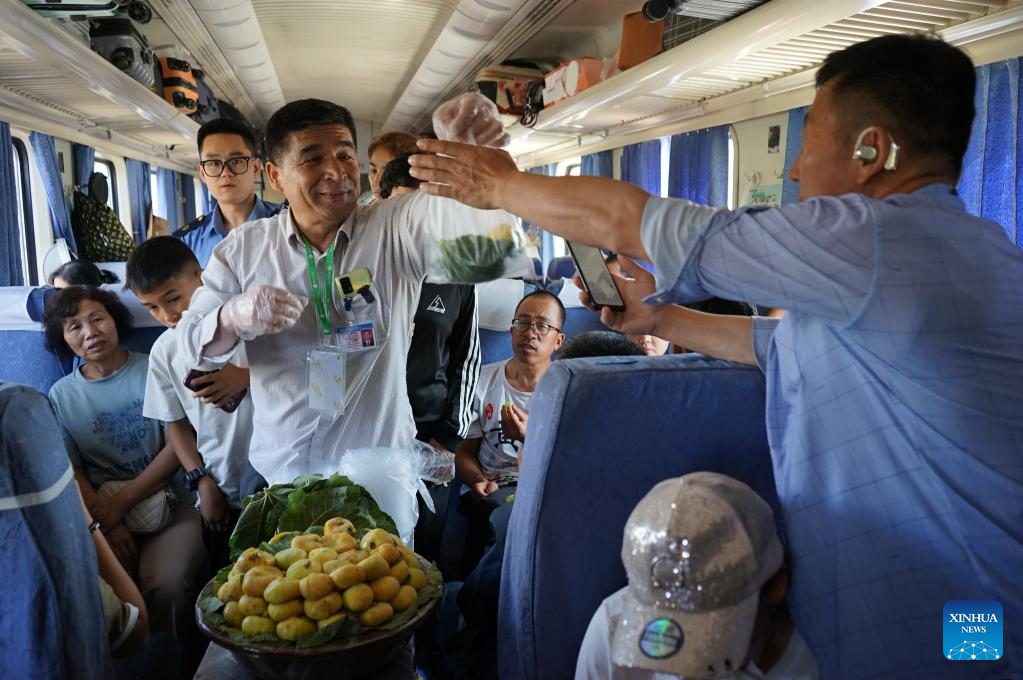
A tourist scans the payment QR code to pay for the figs he bought from vendor Yimamamat Saipar onboard the train No. 7557, Aug. 1, 2024. As a regular on the train, Yimamamat Saipar, hailing from Artux in Kizilsu Kirgiz Autonomous Prefecture of northwest China's Xinjiang Uygur Autonomous Region, finds the journey to Hotan, over 500 km from home, conveniently affordable at a ticket price of only 57 yuan (about 8 U.S. dollars). By selling his homegrown fruits, he can pocket more than 1,000 yuan per trip.(Xinhua/Jin Bowen)
URUMQI, Aug. 14 (Xinhua) -- "Take it for free if it's not sweet," is what Yimamamat Saipar announced to passengers aboard the leisurely green train No. 7557 as he hawked his figs.
This train, connecting Urumqi, capital of northwest China's Xinjiang Uygur Autonomous Region, to Hotan in the region's south, makes nearly every station along its 1,960-km route a stop.
This special slow train not only facilitates travel for residents and farmers heading to bazaars but also delivers a taste of fresh delights to all on board.
As a regular on the train, Yimamamat Saipar, hailing from Artux in Kizilsu Kirgiz Autonomous Prefecture, finds the journey to Hotan, over 500 km from home, conveniently affordable at a ticket price of only 57 yuan (about 8 U.S. dollars). By selling his homegrown fruits, he can pocket more than 1,000 yuan per trip.
"Thanks to this train, our fruits have found their market," the 54-year-old vendor said. "We can vend our produce at the 'mobile bazaar' on the train or take them to nearby county bazaars."
In 2021, to support local farmers, the train crew initiated the "mobile bazaar," showcasing a variety of seasonal produce all year round. From succulent fruits and crisp vegetables to dried goods and vibrant flowers, the train is a cornucopia of almost everything one could imagine.
"Farmers get cash while passengers enjoy the freshness. It's a win-win," Polatkhan, chief conductor of the train, remarked.
As Yimamamat Saipar wheeled his fruit-laden cart down the aisle, the sounds of mobile payment notifications chimed frequently. "Mobile payments are new to them, but they've caught on swiftly," said Polatkhan.
Smartphones are transforming the lifestyles of Xinjiang's locals, with 54,000 5G base stations now built across the region. Every prefecture-level city, county and township in Xinjiang enjoys 5G coverage, with over 20 base stations for every 10,000 residents.
After scanning the payment QR code, Hou Zongmeng, a tourist from northeast China's Heilongjiang Province, eagerly tasted the locally dubbed "sugar bun" figs, describing their taste as "so sweet!" Hou added that the train journey offers not only delectable fruits like figs and plums, but also captivating scenery such as deserts and oases.
Polatkhan, chief conductor of the train for seven years and the "mobile bazaar" operator for three years, has seen many novelties become the norm over the years.
"More locals are communicating in Mandarin, and more tourists are sharing their experiences on social media, attracting others to our train," he said.
Delighted to witness the locals' horizons expanding through increased interaction with tourists from both other provincial-level regions and abroad, Polatkhan said, "I cordially invite everyone to visit southern Xinjiang and experience our unique cultures and customs." ■

Vendor Yimamamat Saipar sells figs onboard the train No. 7557, Aug. 1, 2024. As a regular on the train, Yimamamat Saipar, hailing from Artux in Kizilsu Kirgiz Autonomous Prefecture of northwest China's Xinjiang Uygur Autonomous Region, finds the journey to Hotan, over 500 km from home, conveniently affordable at a ticket price of only 57 yuan (about 8 U.S. dollars). By selling his homegrown fruits, he can pocket more than 1,000 yuan per trip.(Xinhua/Jin Bowen)



